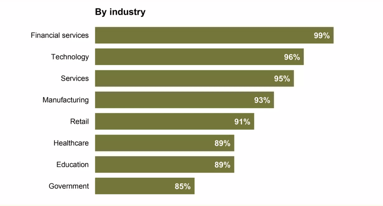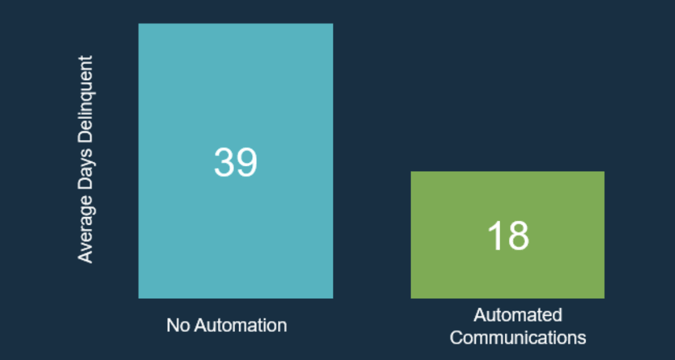How SaaS platforms are unleashing efficiency and agility in the procurement process
Global digital transformation spending is projected to reach 3.4 trillion U.S. dollars by the year 2026. As procurement leaders contemplate their own digital transformations, fields as diverse as finance, supply chains, logistics, accounting, and HR provide a clear roadmap around streamlining processes, transforming workflows, and saving money though digital transformation. For leaders trying to navigate the challenges of digital transformation these lessons are invaluable.
Lessons from the Financial Landscape:
IDG suggests that the top industries for digital-first business strategies are 95% in services, 93% in financial services, and 92% in healthcare. It should come as no surprise that technology-focused sectors like finance have embraced digital transformation.
Enhanced automation has significantly streamlined tasks in finance, automating activities like transaction reconciliations, risk assessments, and fraud detection.
 These advances hold equal potential in procurement, where automated processes can eliminate labor-intensive paperwork, minimize errors, and ensure precise financial transactions. The integration of automated procurement tools can introduce streamlined efficiency and accuracy, akin to the progress witnessed in financial processes.
These advances hold equal potential in procurement, where automated processes can eliminate labor-intensive paperwork, minimize errors, and ensure precise financial transactions. The integration of automated procurement tools can introduce streamlined efficiency and accuracy, akin to the progress witnessed in financial processes.
Digital Transformation as a Differentiator in Supply Chains and Logistics
The COVID-19 pandemic helped push worldwide digital transformation spending in logistics where it is expected to reach $84.6 billion by 2027.
Insights in real-time predictive analytics driven by digital transformation have brought remarkable improvements to supply chain and logistics operations, optimizing inventory management, demand forecasting, and route planning.
It’s also increasingly become a key business differentiator. In a recent Dataconomy article, Kerem Gulen wrote:
“Companies that don’t have an efficient supply chain management system are at a disadvantage. Managing and optimizing the flow of goods and services is crucial for meeting customers’ demands and staying ahead of the competition. Without effective logistics network management, companies may struggle to keep up with the fast-paced changes in the market and may miss out on opportunities to grow their business.”
Similarly with procurement, automating supplier performance monitoring, managing inventory levels, and predicting demand fluctuations is critical for organizations to stand out or stay competitive. Leveraging real-time data, procurement teams can make informed decisions, addressing supply chain disruptions and enhancing overall efficiency.
Drawing from Accounting Data-Backed Decision-Making
The impact of automation on accounting is undeniable. Businesses are rapidly automating payroll processes and deciphering employee engagement data. They have embraced automation for data-driven decision-making.
Digital transformation in accounting streamlines tasks, freeing up time for higher-value activities. It also empowers businesses to continuously collect data for clients, assist in Business Intelligence efforts, drive down costs, and enhance overall performance
In one comparative analysis of companies pre- and post- automation implementation in their accounting practices, companies not using automation had an ADD (Average Day’s Delinquent) of 39 days. Once automation was implemented, the average ADD improved by 53%!

This approach translates seamlessly to procurement, where automated algorithms can analyze historical data to identify cost-saving opportunities, track supplier performance trends, and optimize strategies. By embracing automated analytics, procurement professionals can gain actionable insights similar to the efficiencies observed in accounting.
The Digital Transformation of HR
In HR, automation has swiftly revolutionized candidate selection processes, expediting recruitment and enabling HR professionals to dedicate their efforts to strategic tasks.
Executives say the primary advantages of HR Digital Transformation include enhanced operational efficiency (40%), accelerated time to market (36%), and the capability to satisfy customer expectations (24%).
The continued digital transformation in HR underscores the potential of automation in enhancing efficiency and empowering professionals to engage in high-order initiatives.
The lessons from HR demonstrate how automation can reshape traditional procurement processes, allowing procurement leaders to shift their focus to strategic decision-making and innovation, ultimately driving heightened effectiveness and value.
A Roadmap for Success
By extrapolating the transformative role of automation, a clear trajectory emerges for procurement. The adoption of automated processes and digital transformation empowers procurement professionals to surmount manual challenges and access efficiency, precision, and strategic advantages akin to other sectors.
The insights gleaned from these fields offer a roadmap around injecting automation into procurement workflows, fostering growth, cost optimization, and improved adherence to regulations. Advancement seen in finance, supply chains, logistics, accounting, and HR underscore the potential for a parallel revolution in procurement processes.
Automate Procurement with Ready RFx

.png?width=1275&height=638&name=Get%20an%20inside%20look%20at%20Ready%20RFx.%20(1).png)




